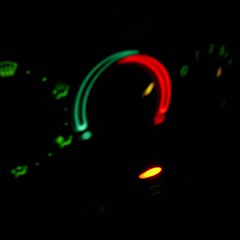 Image by St Stev via Flickr If you deliver your own goods and decide not to outsource your Basildon, Wickford, Pitsea courier work to us at Arrow Light Haulage, then read on for greener driving to help you save some money.
Image by St Stev via Flickr If you deliver your own goods and decide not to outsource your Basildon, Wickford, Pitsea courier work to us at Arrow Light Haulage, then read on for greener driving to help you save some money.Driving greener has the much welcomed benefit of saving you money. If you have to drive, following our tips and tricks will allow you to maximise the usage of your vehicle and your fuel.
:-)On your marks....
* Avoid overfilling the tank when refuelling. Spilled fuel evaporates and releases harmful emissions into the atmosphere and just plain wastes money.
* Make sure that your tyres are inflated to the correct pressure. Under inflation by 7psi will waste half a gallon of fuel in every tank. Inflating to the vehicle manufacturer's guidelines -which are based on cold tyres, so use the petrol station nearest your start point to avoid your tyres warming up and being inflated to the incorrect psi.
* Service your car at least every year. Get the engine tuned, the wheels aligned and catalytic converter checked, and the air con regassed if you insist on using it.
* Reduce weight, and fuel consumption, by removing unnecessary items from your vehicle that do not need to be there for a particular journey. This can include buggies, golf clubs, tools, footwear and all those things you keep 'just in case'
* Check your windows, screenwash and lights – ensuring that your windows are clean and your lights are working will make your journey safer. nothing more environmentally unfriendly than an accident.
:-)Get set....
* Take off roof racks and trailers if they’re not use.
* 61% percent of journeys are under two miles and arguably a waste of fuel and money. short journeys – walk or cycle them instead.
* Engines will be colder on short journeys, and this can double fuel consumption. Do you really need to complete that short journey?
* Planning - as many jobs as possible in one trip saves you money. Aim to get as much as you can out of the journey. Three jobs in one trip is better for the environment than three individual trips!
* Sitting in queues costs money and wastes fuel. Avoid congestion by checking the local news or trafficmaster for delays before you set off. If you hear of delays and jams, route around them.
* Only travel in the rush hour if you absolutely have to, this is more for your sanity as well as fuel conservation.
* Do you know where you are going????. Motorists waste 350,000 tonnes of fuel per year getting lost! You can plan your route on the AA website, it's free too. Alternatively, buy a Sat Nav system, worth their weight in gold and safer than a map.
* Idle your engine during its initial start for no more than 30 seconds. An idling engine produces 80 percent more pollution than when the vehicle is moving. Modern car engines warm up faster when they are in motion.
:-) Go....
* Drive smoothly – pulling away fast can use 60 percent more fuel.
* Slow down. Drive at the speed limit. Driving at 70mph can use up to 30 percent more petrol than driving at 50mph.
* Think ahead to avoid sharp braking - it just throws away energy and money.
* Avoid using the air conditioning, open the air vents instead! Air con uses 15 percent more fuel than the air vents. All on board electronics are also using extra fuel, the rear screen heater for example adds 5 percent to the fuel consumption. Switch them off if you don't need them.
* Change gear between 1,500 and 2,500 rpm – this can save up to 30 percent of fuel. Listen to your engine.
* It's better to switch your engine off when in stationary traffic. You use more fuel with the engine idling for 60 seconds than if you switched off and restarted 60 seconds later.
* Did you know..... traffic lights are programmed to change according to the speed limit. If you are stopped at one red light but then drive on at the correct speed you will usually find that by the time you reach the next few sets of lights, they will be turning green for you. Try it and see.
* Careful motorway driving will improve safety and traffic flow. The concertina effect caused by one motorist breaking sharply often results in traffic slowing to a near stop due to the delayed reaction of drivers behind. If we drive pro-actively, and try to observe the car three or four ahead. Then we can give ourselves some distance from the car in front. We can anticipate and judge the necessary speed. When you see a car up ahead start to brake, simply remove your foot off the accelerator. By the time you get close to the car in front the chances are that they will have accelerated and moved further on.
Sarah
The greener Essex Courier company

![Reblog this post [with Zemanta]](http://img.zemanta.com/reblog_e.png?x-id=6803815a-5d0f-4c3d-9650-381fbe42c6f6)




No comments:
Post a Comment